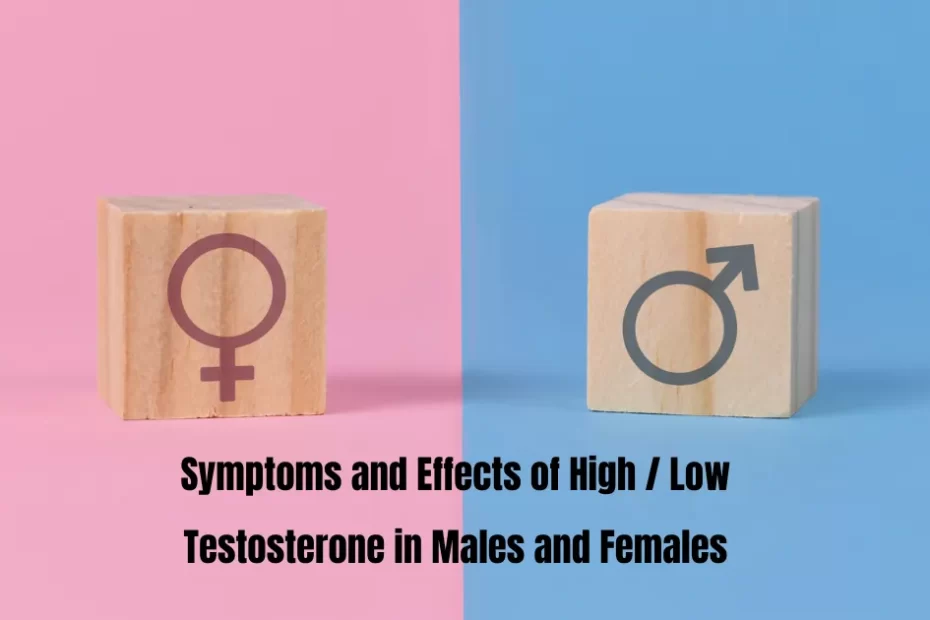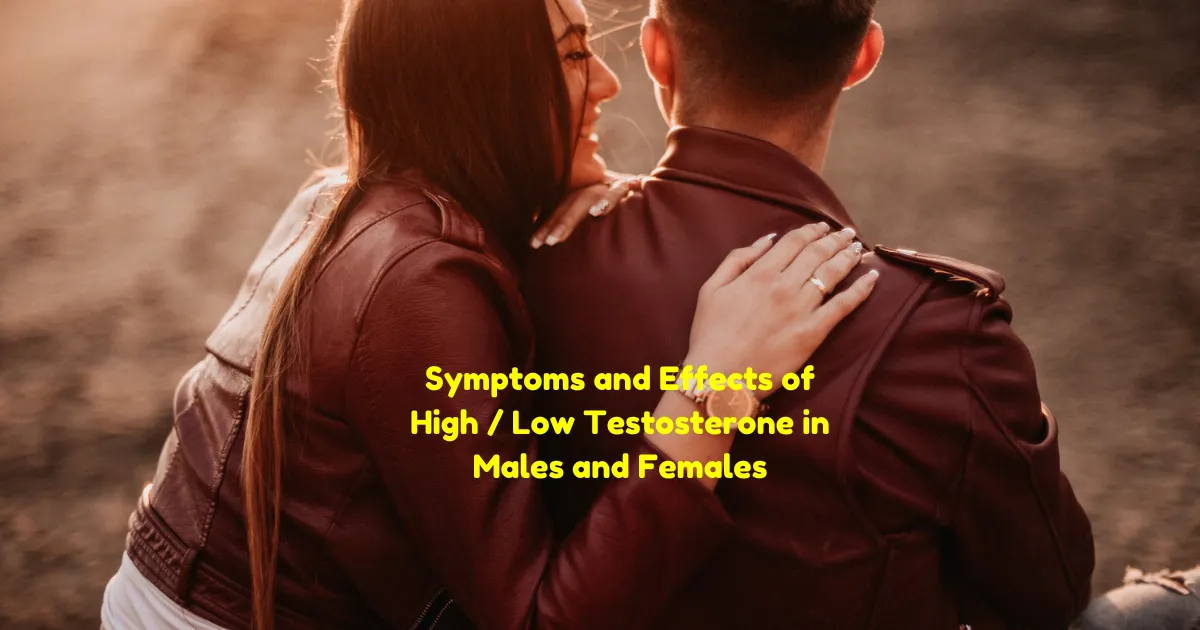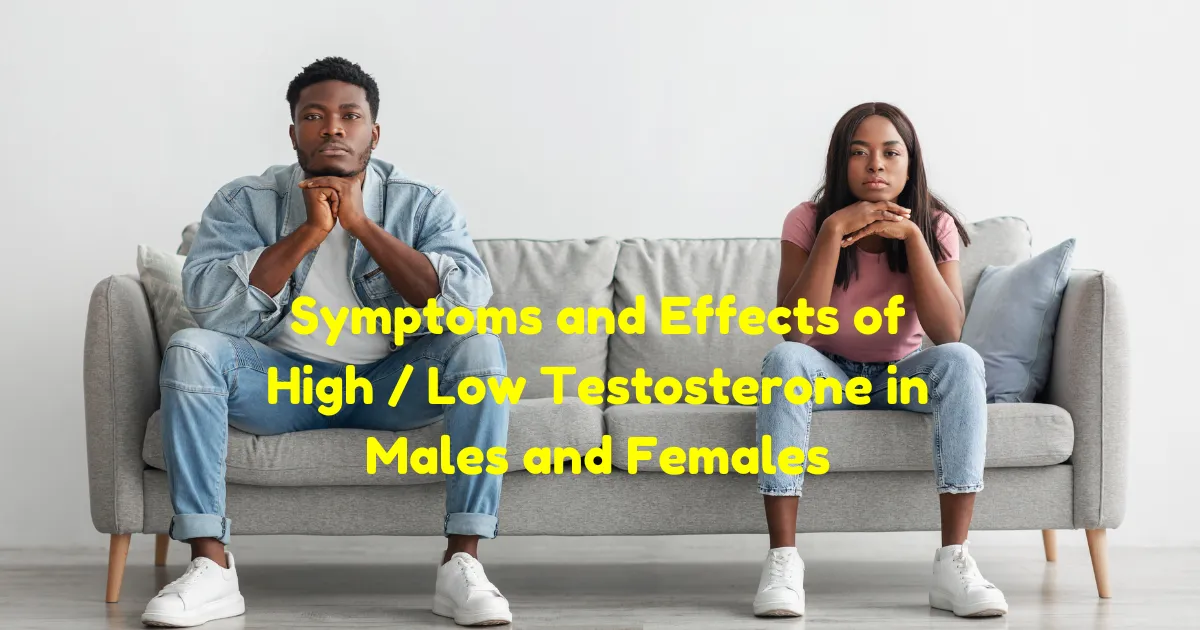Testosterone Levels: Testosterone is a sex hormone primarily found in males, although females produce it in smaller amounts. It belongs to a class of male hormones called androgens, which is crucial for both men and women.
- Testosterone Levels play a key role in the following:
- How do Testosterone Levels Differ Between Males and Females?
- Symptoms and Effects of Low Testosterone Levels in Males and Females
- Symptoms and Effects of High Testosterone in Males and Females
- Potential Causes of High Testosterone in Males and Females
-
Potential Causes of Low Testosterone Levels in Males and Females
- Males
-
Females
- Polycystic Ovary Syndrome (PCOS)
- Primary Ovarian Insufficiency
- Adrenal Gland Disorders
- Aging
- Available Treatment Options for Low Testosterone
- Testicular Tumors
- Adrenal Gland Disorders
- Anabolic Steroid Use
- Available Treatment Options for High Testosterone
- Polycystic Ovary Syndrome
- Congenital Adrenal Hyperplasia
- Tumors
- Lifestyle Factors Affecting Testosterone Levels:
- Natural Remedies or Lifestyle Changes:
- Risks or Side Effects of Testosterone Replacement Therapy:
- Impact of Testosterone Levels on Fertility and Sexual Health:
Testosterone Levels play a key role in the following:
- Development of Reproductive Tissues: Testosterone is essential for the development of the testes and the production of sperm in males. In females, it is produced in the ovaries and contributes to ovarian function.
- Secondary Sexual Characteristics: Testosterone is responsible for developing secondary sexual characteristics in males, such as facial and body hair, deepening of the voice, and increased muscle mass.
- Bone Density: It plays a crucial role in maintaining bone density. Low testosterone levels can lead to bone loss and osteoporosis.
- Muscle Mass and Strength: Testosterone contributes to muscle mass and strength growth and maintenance.
- Libido and Sexual Function: Testosterone is associated with sexual desire (libido) and plays a role in sexual function.
- Mood and Energy Levels: While the relationship is complex, testosterone can influence mood and energy levels. Low levels might contribute to fatigue and mood disturbances.
How do Testosterone Levels Differ Between Males and Females?
Testosterone levels in males are significantly higher than in females. However, both genders produce and require testosterone. It is produced mainly in the testes, while in females, it is made in the ovaries. Women also produce testosterone in the adrenal glands.
Symptoms and Effects of Low Testosterone Levels in Males and Females
Males
Low Libido
A decrease in sexual desire
Erectile Dysfunction
Difficulty achieving or maintaining an erection
Fatigue
Low energy levels and increased fatigue
Depression and Irritability
Mood changes, including depression and irritability
Decreased Muscle Mass
Loss of muscle mass and strength
Decreased Bone Density
Increased risk of osteoporosis
Females
Low Libido
Similar to males, a decrease in sexual desire
Menstrual Irregularities
Irregular or absent menstrual periods
Fatigue
Low energy levels and increased fatigue
Decreased Bone Density
Increased risk of osteoporosis
Mood Changes
Changes in mood and increased risk of depression
Decreased Muscle Mass
Symptoms and Effects of High Testosterone in Males and Females
Males
Aggressiveness
Increased aggression or mood swings
Acne and Oily Skin
Elevated testosterone can stimulate sebum production
Sleep Apnea
High testosterone levels have been linked to sleep disturbances.
Females
Irregular Menstrual Periods
Elevated testosterone can disrupt the menstrual cycle
Acne and Oily Skin
Similar to males, increased sebum production
Excessive Hair Growth
Known as hirsutism, where women develop male-pattern hair growth
Potential Causes of High Testosterone in Males and Females
Males
Testicular Tumors
Tumors in the testes can lead to increased testosterone production.
Adrenal Gland Disorders
Disorders affecting the adrenal glands
Anabolic Steroid Use
Abuse of anabolic steroids can elevate testosterone.
Females
Polycystic Ovary Syndrome
PCOS: Common cause of elevated testosterone in women.
Congenital Adrenal Hyperplasia
A genetic disorder affecting the adrenal glands.
Tumors
Tumors in the ovaries or adrenal glands can cause increased testosterone.
Potential Causes of Low Testosterone Levels in Males and Females
Males
Aging
Testosterone levels tend to decline with age
Hypogonadism
Conditions affecting the testes, such as injury or infection
Chronic Illness
Conditions like diabetes or chronic liver disease
Obesity
Excess body fat can contribute to lower testosterone
Females
Polycystic Ovary Syndrome (PCOS)
A common cause of elevated testosterone in women.
Primary Ovarian Insufficiency
Ovaries do not function properly.
Adrenal Gland Disorders
Conditions affecting the adrenal glands
Aging
Testosterone levels also decline with age in females.
Available Treatment Options for Low Testosterone
Testicular Tumors
Tumors in the testes can lead to increased testosterone production.
Adrenal Gland Disorders
Disorders affecting the adrenal glands
Anabolic Steroid Use
Abuse of anabolic steroids can elevate testosterone.
Available Treatment Options for High Testosterone
Polycystic Ovary Syndrome
PCOS: Common cause of elevated testosterone in women.
Congenital Adrenal Hyperplasia
A genetic disorder affecting the adrenal glands.
Tumors
Tumors in the ovaries or adrenal glands can cause increased testosterone.
Lifestyle Factors Affecting Testosterone Levels:
Maintaining healthy testosterone levels involves more than just medical interventions; it also requires a balanced lifestyle. Lifestyle choices play a pivotal role.
Regular exercise, mainly cardiovascular workouts and strength training, can naturally boost testosterone production. Conversely, leading a sedentary lifestyle and excessive endurance exercise may contribute to lower levels. Sufficient and quality sleep are equally crucial; inadequate sleep can disrupt hormonal balance, including testosterone levels.
Stress management is paramount, as chronic stress can elevate cortisol levels, inhibiting testosterone production. Maintaining a healthy weight is also essential, as obesity correlates with lower testosterone levels.
Nutrition plays a crucial role; diets rich in essential nutrients, including zinc and vitamin D, have a positive impact on testosterone production.
Natural Remedies or Lifestyle Changes:
Natural methods for regulating testosterone involve strategic lifestyle adjustments. Ensuring a balanced diet, emphasizing sufficient protein, healthy fats, and essential vitamins and minerals, supports hormonal health.
Regular physical activity, particularly strength training, helps increase testosterone levels. Adequate sleep, preferably 7-9 hours per night, provides the necessary recovery time for hormonal balance.
Stress reduction techniques, such as mindfulness and relaxation exercises, have a positive impact on testosterone production. Certain natural supplements, like ashwagandha and fenugreek, have shown promise in supporting healthy testosterone levels. Adopting these lifestyle changes helps maintain hormonal balance and promotes overall well-being.
Risks or Side Effects of Testosterone Replacement Therapy:
- Fluid Retention: Edema or swelling.
- Worsening Sleep Apnea: Especially in individuals with pre-existing sleep apnea.
- Increased Risk of Blood Clots, Especially in Older Men.
- Worsening Prostate Issues: Possible risk in older men.
Impact of Testosterone Levels on Fertility and Sexual Health:
Testosterone levels play a critical role in both male and female fertility. In males, low testosterone can lead to reduced sperm production and quality, affecting fertility. It may also contribute to erectile dysfunction and a decline in libido. Conversely, elevated testosterone in males may lead to a decrease in fertility due to a disruption in the delicate hormonal balance required for reproductive health.
For females, testosterone plays a crucial role in normal ovarian function. Low levels can contribute to menstrual irregularities and fertility issues. In cases of high testosterone in females, disruptions in menstrual cycles and reproductive health can occur. Maintaining balanced testosterone levels is essential for optimal sexual health and fertility in both genders, underscoring the importance of timely intervention and treatment when hormonal imbalances are identified.
Long-Term Consequences of Untreated Low or High Testosterone Levels:
Untreated low or high testosterone levels can lead to several long-term consequences affecting physical and mental health. In the case of untreated low testosterone in males, there’s an increased risk of osteoporosis due to decreased bone density. Muscle mass and strength loss is also common, impacting overall physical function. Mood disorders, including depression and irritability, may persist, affecting mental well-being. For females with untreated low testosterone, the risk of osteoporosis and cardiovascular issues may also increase.
Conversely, untreated high testosterone can lead to various health issues. In males, persistently high levels may contribute to increased aggression, acne, and sleep disturbances. Females may experience irregular menstrual periods, excessive hair growth, and disruptions in reproductive health. Long-term, these untreated conditions can impact overall quality of life and increase the risk of cardiovascular complications.


